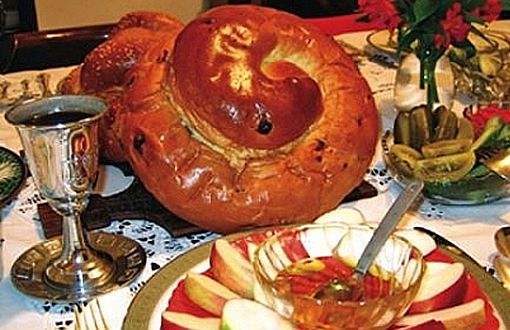Click to read the article in Turkish
Rosh Hashanah, which is considered the first day of the year according to the Jewish calendar, is 163 days later than the first day of Pesach. The day of Rosh Hashanah changes each year. It is celebrated on September 5 the earliest and on October 5 the latest.
It is celebrated from September 6 to 8 this year.
The activities prohibited on the day of Shabbat on Saturday are also prohibited throughout the day when Rosh Hashanah is celebrated.
At dinner, symbolic foods expressing hopes and wishes for the new year are eaten by saying the related prayer.
On Rosh Hashanah, round Challah bread is served, symbolizing the cycle of the year. On the second morning of the new year, a hollowed-out ram's horn called Shofar is blown at synagogue to wish a happy new year.
Between the days of Rosh Hashanah and Kippur, it is required to do Tsedaka (charity). It is viewed as a duty of co-religionism to help the ones in need.
As reported by Şalom, Chief Rabbi Rav İshak Haleva has shared a message on the occasion of Rosh Hashanah. Addressing the Jewish community in Turkey, Rav Haleva has recalled how the period that we live in is the right time to search one's heart and conscience.
We wish a happy Rosh Hashanah.
Briefly about Rosh HashanahNational Geographic shares the following information in brief about the origins and meaning of Rosh Hashanah as well as how it is celebrated: "Rosh Hashanah begins on the first day of Tishri, the first month of the calendar's civil year and seventh month of its religious year. Given that the Hebrew calendar is more than a week shorter than the Gregorian calendar and, according to tradition, originated with the biblical creation of the universe, this holiday will mark the beginning of the year 5782 for Jews worldwide. "Hebrew for 'head of the year,' Rosh Hashanah is a chance not just to celebrate and look ahead, but to consider the past and review one's relationship with God. It also marks the first day of a period known as the Ten Days of Awe, or Days of Repentance, during which a person's actions are thought to be able to influence both God's judgment and God's plan for that person. "These high holy days culminate in Yom Kippur, a time of atonement that is considered the holiest day of the year. "In the leadup to Rosh Hashanah, the shofar—a trumpet made from a ram or kosher animal's horn—is regularly sounded in synagogues. The holiday itself is celebrated with even more shofar blasts, usually a hundred during the services on both days. Many Jews interpret the sound as a call to repent of sins and seek forgiveness from God. "Work is prohibited on Rosh Hashanah, and many Jewish people spend the holiday attending special services at their synagogues and then celebrating with festive meals. "Rosh Hashanah has its own symbolic foods: round challah, apples, and honey. Symbolizing God, the cycles of the year, and the sustenance that lies ahead, a rounded challah loaf, often studded with raisins, is usually dipped in honey and eaten in a celebratory meal. "So are apples, which represent hope for a sweet year ahead. The tradition of eating apples for Rosh Hashanah is thought to have originated with Ashkenazi Jews in Europe who used the fall fruit in their new year's meals." |
(KÖ/SD)




